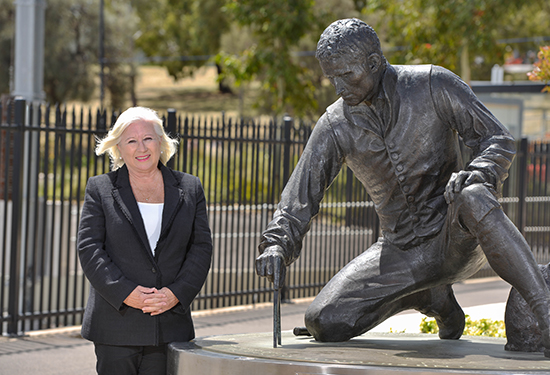
Driving essential change to improve rural and remote health services has been a primary focus of Professor Robyn Clark’s (DipAppSc(Nurs) ’86, BNg(PostReg) ’94) innovative Cardiac Rehabilitation work, which aims to reduce rehospitalisation and improve quality of life after an acute cardiac event.
Professor Clark, a researcher within Flinders University’s Caring Futures Institute and a Fellow of the American Academy of Nursing, works with diverse teams – including doctors, pharmacists, statisticians, health economists, geographers, nurses and local communities – to find digital health-based solutions that can serve as a long overdue facilitator of health change in rural and remote Australia.
Acknowledging that one model of care does not suit all people – with particular reference to women, the elderly, those with low literacy and low socio-economic status, and those who are culturally and linguistically, diverse including Aboriginal and Torres Strait Islander people – Professor Clark has developed and tested interventions designed to improve patient self-management and bedside education, using advanced digital technologies that include avatars and telemonitoring.
Professor Clark came to understand this need for change during her PhD studies, when her telehealth examination of almost 700 rural patients living with heart failure, revealed that all of them had to travel to the city for specialist care, underlining a yawning health access disparity between rural and city populations.
“Statistics show that the health needs of rural and remote populations are much higher than city people, yet this wasn’t being recognised, and certainly not acted upon,” she says. “That served as my inspiration to do something from a nursing-led perspective.”
Her research has earned international recognition and is now being widely applied to other patient populations, particularly to those individuals who live with chronic diseases such as cancer, diabetes, chronic obstructive lung disease and neuromuscular disease.
Professor Clark has also been instrumental in being invite to led the scientific evaluation of such important funded programs as The Pinnaroo Project, a community-led arts in health project to improve general and mental health within a local rural community, and The CHAP Project, the Country Heart Attack Prevention project, delivered by Professor Clark and her Flinders team in collaboration with SA Health, Heart Foundation, the Australian Cardiovascular Health and Rehabilitation Association and the International Council of Cardiovascular Prevention and Rehabilitation. The CHAP Model of care will now be implemented across the state and work is under way to establish an accreditation program for cardiac rehabilitation programs in South Australia, to improve the quality of providers and programs across existing health services to international standards.
“Introducing better systems empowers local communities to bond together and become stronger, with the leadership and contribution of nurses to support them when doctors are in limited supply. It’s a significant responsibility for nurses to take a leading role in driving wholesale change in this new era of digital health. Rural and metro specialist nurse working together in rural and remote communities, can drive the solutions.”
Professor Robyn Clark was awarded a 2023 Distinguished Alumni Award for her distinguished contribution to research that is improving access to evidence based cardiovascular care for underserviced and disadvantaged populations.

